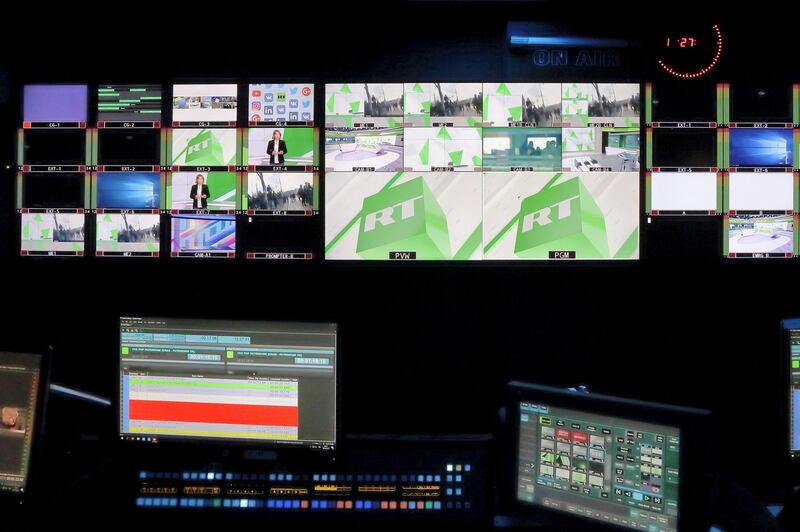At the London headquarters of the Russian propaganda outfit RT, there is a sense of panic in the air.
"Today is especially busy," the young receptionist at The Millbank Tower declares. "You can't come in without an appointment".
The River Thames flows past less than a hundred meters away as Prime Minister Theresa May's face pops up on the lobby's multiple television screens. She is just down the road in the palace of Westminster, announcing the expulsion of more than 20 Russian diplomats from the UK in the wake of the poisoning of a Russian double agent in Salisbury.
The Millbank Tower is an office block in central London that has seen some real history. In 1997, two floors served as the campaign headquarters for Tony Blair's landslide electoral victory. It would later house the Conservative Party's Campaign Headquarters.
With the 16th floor now home to RT- a Kremlin backed broadcaster, The Millbank Tower is the focus of yet another of history's scandals.
Since the poisoning of a Russian double agent more than a week ago in Salisbury, attention has mounted on RT, a broadcaster formerly known as Russia Today.
________
Read more
Britain expels 23 Russian diplomats over nerve agent attack
[ Lessons not learned after my husband's death, warns Marina Litvinenko ]
________
Since the Salisbury poisoning, widespread concerns over the network have been voiced in the House of Commons, and a number of MPs have drawn criticism for appearing on, and accepting payment from the channel. To its critics, RT is a purveyor of Russian state propaganda, but its defenders stress that any attempt to shut it down would amount to an assault on free speech.
Mrs May said that the broadcaster's status was a matter for the independent regulator Ofcom.
Ofcom was quick to announce this week that it had written to RT to say it was conducting a review of the station's broadcasting licence. "This letter explained that, should the UK investigating authorities determine that there was an unlawful use of force by the Russian State against the UK, we would consider this relevant to our ongoing duty to be satisfied that RT is fit and proper." It added, the regulator would "carry out our independent fit and proper assessment on an expedited basis".
Charlie Beckett, a professor at LSE warned against a ban, but stressed that regulation through Ofcom was a different matter. "It would be an appalling precedent for our government to take action against a news media organisation that has not broken any laws - regulation is a different matter, but it is up to Ofcom to decide on that. The last thing we want to do is give succour to states that restrict media freedom.
"The last thing we want is for our government or any other to take punitive actions against media organisations because of the actions of their governments or citizens. RT is the Russian state broadcaster with clear links to the Kremlin. It often fails to match the standards we would expect of the BBC, for example", he told The National.
In a debate on the poisoning on Monday, Labour MP Chris Bryant asked the House of Commons "Can we just stop Russia Today just broadcasting its propaganda in this country?"
Labour's shadow Chancellor, John McDonnell, who himself as made multiple appearances on the channel, questioned its coverage of the Salisbury poisoning. "I've been looking overnight at some of what's happening in terms of changes in coverage on Russian television, in particular, and I think we have to step back now,"
"We tried to be fair with them and as long as they abide by journalistic standards that are objective that's fine, but it looks as if they have gone beyond that line", he added.
But a spokesperson for the channel claimed it was being used "a sacrificial political pawn", and that Russian officials would see a difference in regulation, and an outright ban, is unlikely.
Sarah Hurst, founder of the X Soviet blog, and a former BBC journalist warned that shutting down RT could be self-defeating. "[A ban] would likely involve retaliation against the BBC [in Russia]. There are pros and cons to it as the BBC is more significant than RT. Russians would like to have access to objective news that they don't get on their TV. Could we really stop RT on the internet?" Though she conceded "in the end, we have to expect retaliation no matter what we do".
For now, RT is still broadcasting, but its status seems more precarious now than ever. Evident in Foreign Ministry Spokesperson, Maria Zakharova's response to the Ofcom review. "I can tell you right now that not a single British media outlet will be working in our country if they shut RT down."







